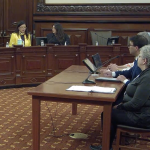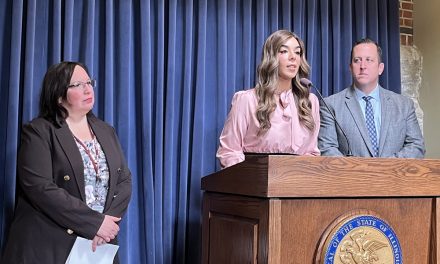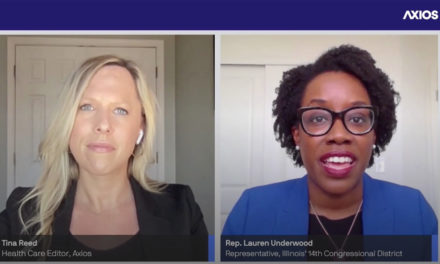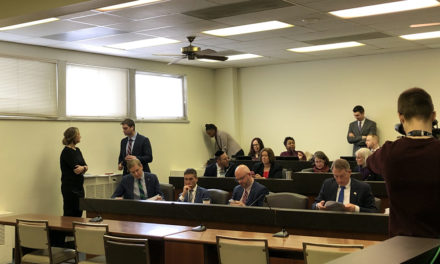
Ford on raising awareness for return of redeterminations, advocating for overdose prevention sites
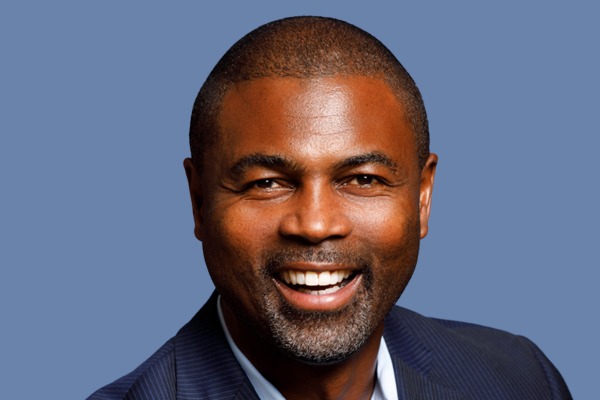
Rep. La Shawn Ford, D-Chicago, joined stakeholders last week to launch a campaign to raise awareness of the potential challenge of connecting people with opioid use disorder to needed services if they lose their health coverage through the Medicaid redetermination process.
Ford spoke with Health News Illinois about the importance of lawmakers speaking to constituents to raise awareness for the return of redeterminations, as well as his continued efforts to create overdose prevention sites in Chicago, where individuals can use previously purchased drugs under trained supervision.
Edited excerpts below.
HNI: Why is a campaign like this so important, especially ahead of the return of Medicaid redeterminations?
LF: Fatal overdoses went up during the pandemic when we had the shutdown, where people were not able to visit their programs when they were not able to get the medication-assisted treatment. If they don’t redetermine, we could see pandemic numbers of fatal overdoses. We must be sure that all of the providers and people that provide substance use therapy are engaging with their clients to ensure that they will be covered and don’t lose their insurance.
Redetermination is a problem. Records show that possibly 700,000 people are at risk of losing their health insurance if they don’t redetermine. So that’s on top of all of the eligible people in the state of Illinois that actually qualify but are not enrolled. We have a solution to some of the problems that we see in our communities as it relates to connecting people to care if we make sure that everyone’s covered.
HNI: Are there things that lawmakers can do to support stakeholders in this work?
LF: The governor has already invested, I think $18 million, in making sure that we do everything we can to raise awareness and to get people to re-enroll. The more we talk about it publicly like this, the more people become aware.
With healthcare, people don’t use it until they need it, or they don’t think they need it until they need to use it. We have to make this a serious campaign. The anniversary date for individuals to enroll is the date that they get their first coverage. I spoke at Above and Beyond (Wednesday) — this group provides treatment for people with substance use disorder — and raised awareness there. So wherever I go, I do my best to raise awareness on the issue.
HNI: You’ve advocated for overdose prevention sites, where individuals can use previously purchased drugs under trained supervision. How does that fit into this?
LF: It is a response to an epidemic more than anything. No one is out here trying to open up an overdose prevention site just because we want to provide places for people to use. We are responding to an epidemic that’s international — preventable drug overdoses are an international problem.
We’ve learned that things are not going to get better as we look at the supply of fentanyl that’s killing people. It’s getting worse, and more and more fentanyl is hitting the streets. The more fentanyl that hits the streets, it becomes even more potent and more people are dying. This is a proven strategy, and probably the number one harm reduction tool that we have available that saves lives and prevents fatal overdoses. All the harm reduction community groups are calling for it.
HNI: Where does the bill stand?
LF: We need the Department of Human Services to really help push this. They believe in the harm reduction of the overdose prevention site. In fact, this is an idea that was in the governor’s proposal for fighting opioids, so it’s just a matter of the state being very careful in passing a bill.
Passing this overdose prevention bill is a response to a crisis, but it still doesn’t stack up overdose prevention sites. It just allows for the department to begin putting together a plan for what we believe would be safe proposal for a (notice of funding opportunity) for people to apply for. So the state would put together the program and the put out a NOFO for an agency or healthcare provider to say, ‘Yeah, we want to open up overdose prevention site. It’s a pilot, and it’s only for Chicago.’
HNI: Have you spoken with DHS on this?
LF: They helped write the language, but they’re still very cautious about putting out and passing the bill at this time. For some reason, they are very cautious about moving the needle. But what we’ve learned is that from the different locations across the world, these are proven sites to save lives. No one dies in overdose prevention sites. They die in the street, in an alley or a hallway, or on a bus or public transportation. They don’t die in safe places.




